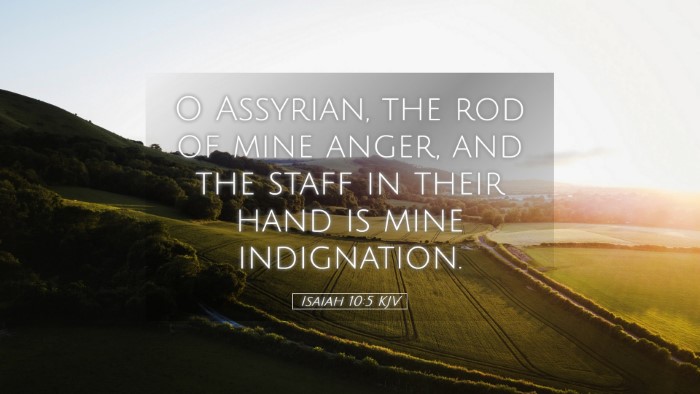Isaiah 10:5 - Summary and Commentary
Verse (Isaiah 10:5, KJV): "O Assyrian, the rod of mine anger, and the staff in their hand is mine indignation."
Background and Context
The book of Isaiah is primarily associated with the prophet Isaiah, who prophesied during a tumultuous period in the history of Israel and Judah. Chapter 10 reveals God’s judgment against Assyria, which He employed as an instrument of His wrath to punish the rebellious nation of Israel. The context of the verse thus revolves around divine sovereignty, judgment, and the consequences of sin.
Commentary Insights
1. Divine Sovereignty and Punishment
Matthew Henry emphasizes that the Assyrians, though a wicked nation, are described in this verse as "the rod of God’s anger." This indicates that God exercises control over all nations and uses even those who are not His people to fulfill His purposes. The image of a rod reflects authority and the mechanism of punishment, suggesting that God utilizes the Assyrians to chastise Israel for their iniquities.
2. God’s Indignation
Albert Barnes posits that the "staff" in the Assyrians’ hand represents the authority and power that God has allowed them to wield. This underscores a theological principle that divine permission is granted even to oppressors when desired lessons of humility and repentance are needed by His people. The phrase "mine indignation" reminds readers that the actions of Assyria are essentially God’s judgment against Israel’s turning away from Him.
3. The Role of Assyria
Adam Clarke elaborates on the significance of Assyria's role in the narrative. He notes that while Assyria is used as a tool of God’s judgment, they themselves will also face repercussions for their pride and cruel actions. Clarke notably connects this to the broader theme of divine justice; though they are instruments of chastisement, their own destination leads to ruin because they exceed their commission.
4. Theological Implications
This verse serves as a profound reminder of God’s omnipotence. His ability to use even the worst actors as tools for good shows a complex relationship between human actions and divine will. The sovereignty of God extends over all creation, regardless of their morality or intentions.
5. Applications for Today
For contemporary readers and leaders, Isaiah 10:5 challenges the notion that God only works through the faithful. In today’s world, where national and personal calamities may be seen as defeats, this passage calls for reflection on divine purpose in adversity. As pastors and theologians ponder this verse, they can draw applications about the nature of evil, suffering, and God’s providential care amidst trials.
6. The Call to Repentance
Finally, the acknowledgment of Assyria as a means of God's anger leads to an essential call to repentance. God desires His people to return to Him, emphasizing that the test of faithfulness often comes amidst trials. A comprehensive understanding encourages believers to seek righteousness and realign themselves with God's will, even when faced with adversity.
Conclusion
Isaiah 10:5 encapsulates rich theological truths about divine sovereignty, judgment, and the nature of repentance. As a foundation for further reflection, it provides a lens through which to examine current predicaments not merely as random acts but as opportunities for divine encounters and transformation.


